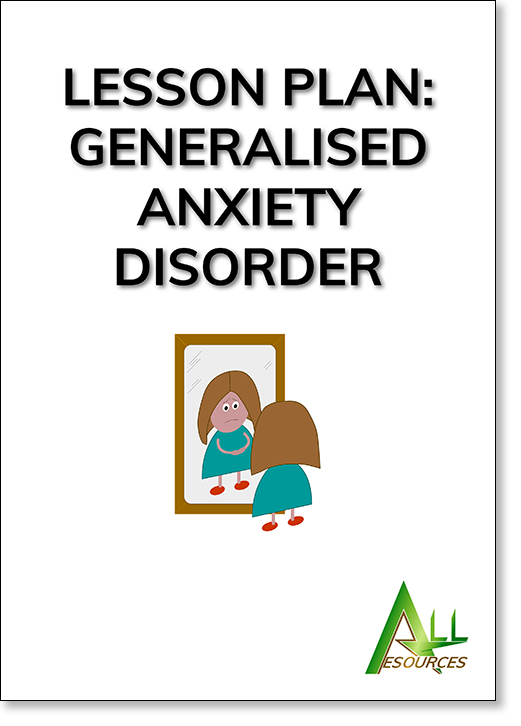Anxiety in Young People

Generalised Anxiety Disorder
A lesson plan examining anxiety and generalised anxiety disorder — a more extreme form of anxiety.
- Age range: 12 years and upwards
- Category: Lesson plan
- First published: 2022
- Pages: 14
- Duration: 55 mins – 1 hour
Hard copy: £10.99 add to basket
Growing up in the 21st century has its challenges, and many young people experience feelings of panic and fear at certain times. So why do young people feel anxious, and what are the signs that indicate anxiety disorder in young people?
Causes of Anxiety in Young People
There are a number of things that can lead to feelings of anxiety in youngsters. Some of the most common causes include:
- Pressure from parents
- High expectations to look a certain way, pass exams, to be popular leading an exciting life
- Peer pressure — constant pressure to check social media to update status and to view status of others — e.g. FOMO (Fear of Missing Out)
- Hormonal changes
- Alcohol and drugs
- Brain development
- Loss of a friend or relative
- Family problems
- Moving house and/or changing schools
It is important that parents and teachers are aware of the signs of anxiety in young ones. If they can recognise the symptoms, they will be better placed to help them look at ways to cope with anxiety.
Symptoms of Anxiety in Young People
When young people are anxious, they may exhibit some of the following signs:
- They appear agitated, restless and extremely tense
- They are overly concerned with the opinions of others
- They may overreact to criticism
- They worry excessively about things that may never happen
- There may be a distinct decline in academic performance
- They find it difficult to sleep
- They may complain about a variety of ailments — headache, backache, stomach ache etc
The above symptoms can be overlooked because young people often keep their feelings to themselves. If you notice any of the above, particularly if the symptoms intensify, you may need to seek medical assistance.
Panic Attacks in Young People
Just as in adults, a traumatic life event or distressful situation can cause a young person to have a panic attack. They may complain of a racing heartbeat, nausea, dizziness, a shortness of breath or a dry mouth. A young person’s panic attack will pass, so encourage the young person to calm down, close their eyes and breathe in and out slowly to the count of five. It would be wise to help the young person look at ways to control their anxiety and stress such as breathing exercises, meditation and CBT.
Mental Health Awareness Week
The theme for this year’s Mental Health Awareness Week is: ‘Anxiety’. The focus is on raising awareness of anxiety and looking at different ways to prevent it.


